Thomas James Richards, Diaries, Transcript Vol. 3, 26 January to 8 November 1916 - Part 30
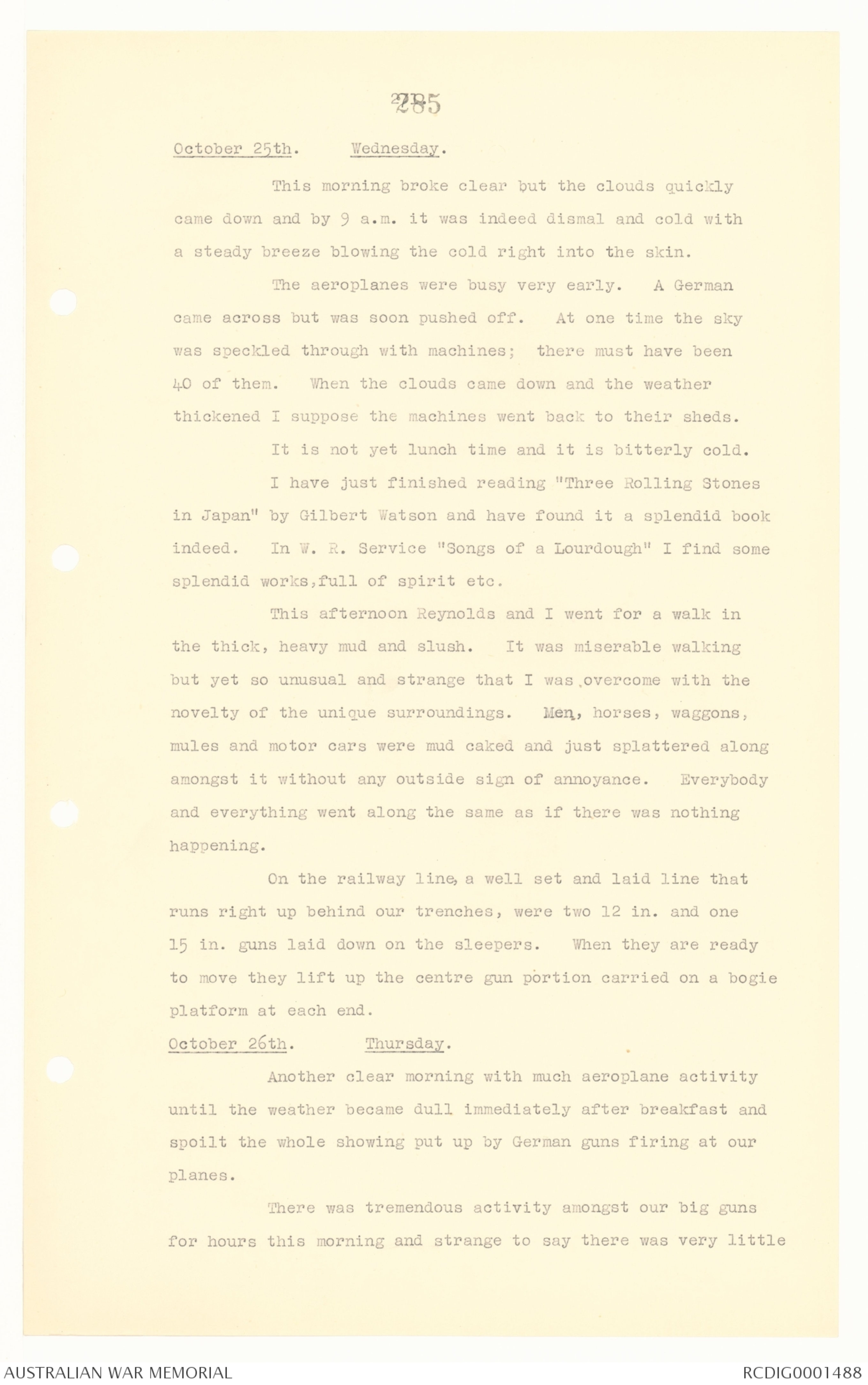
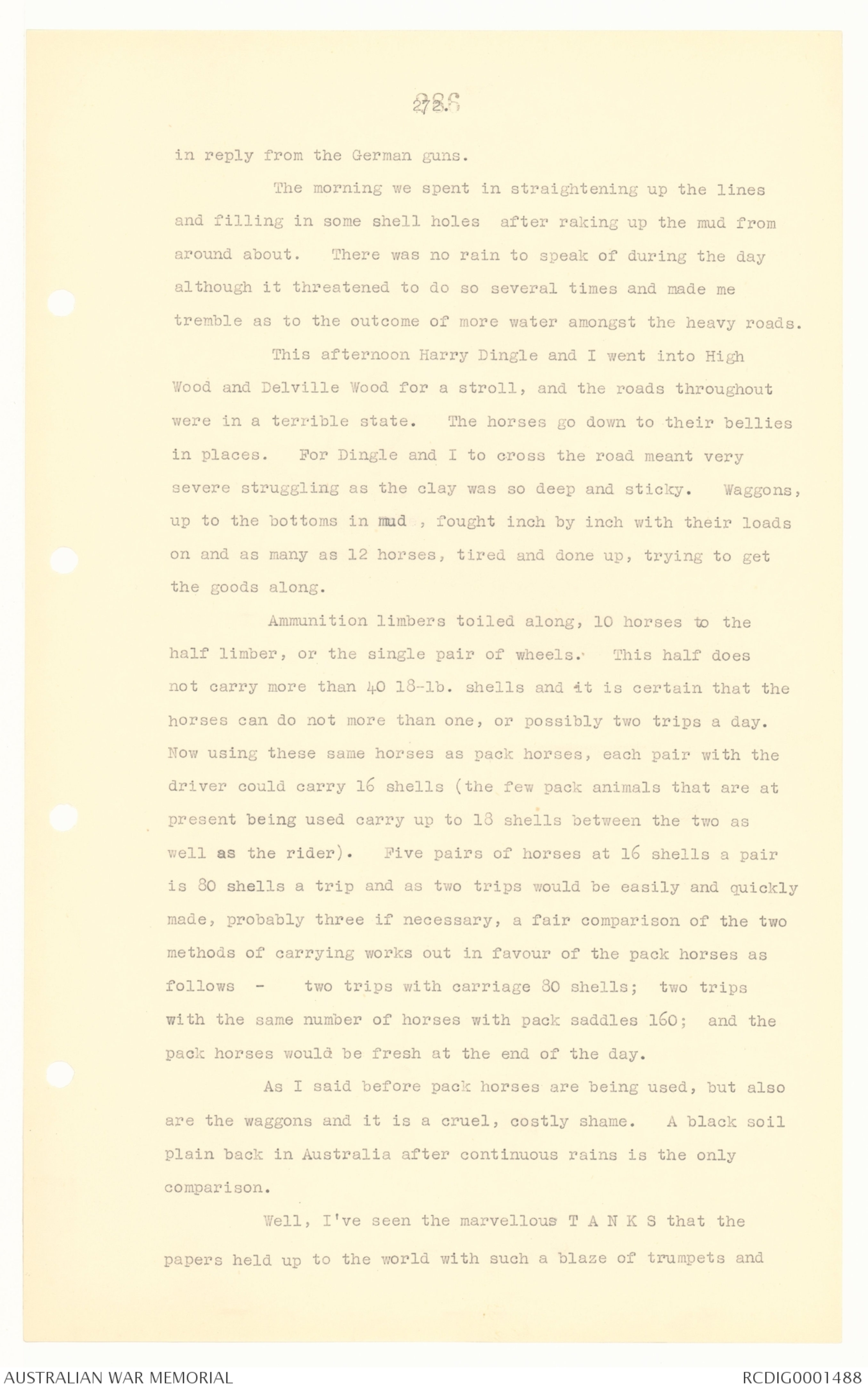
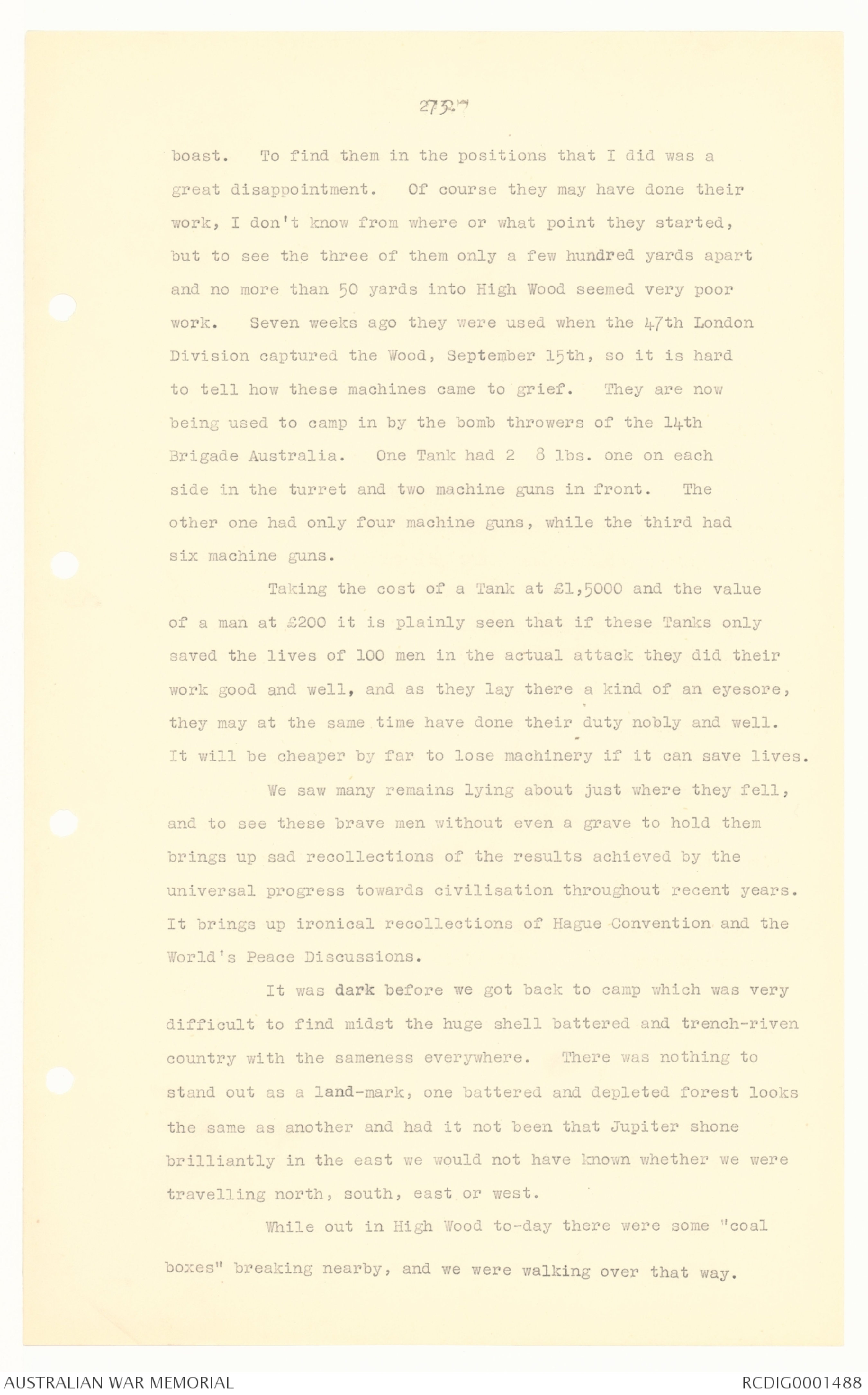
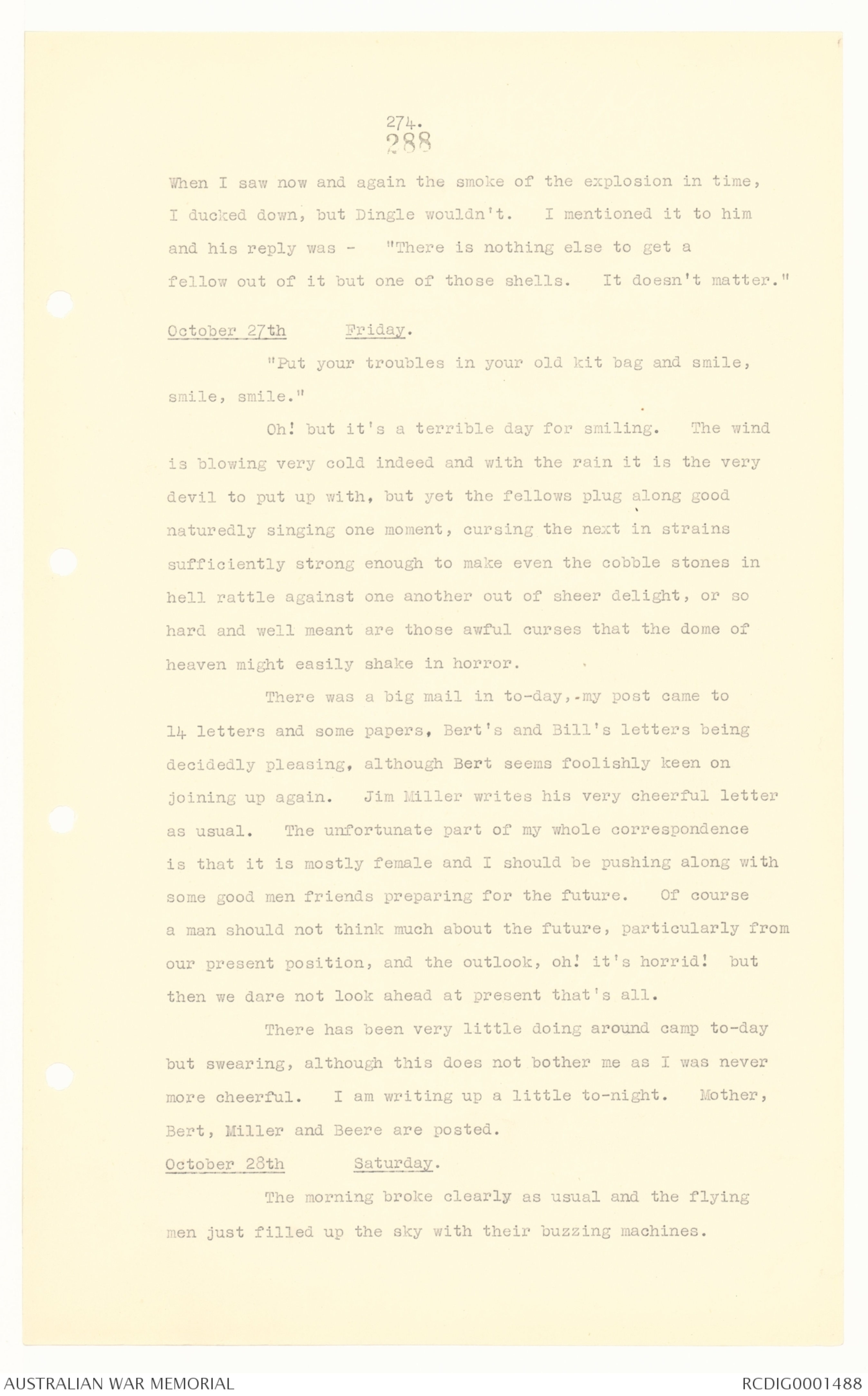
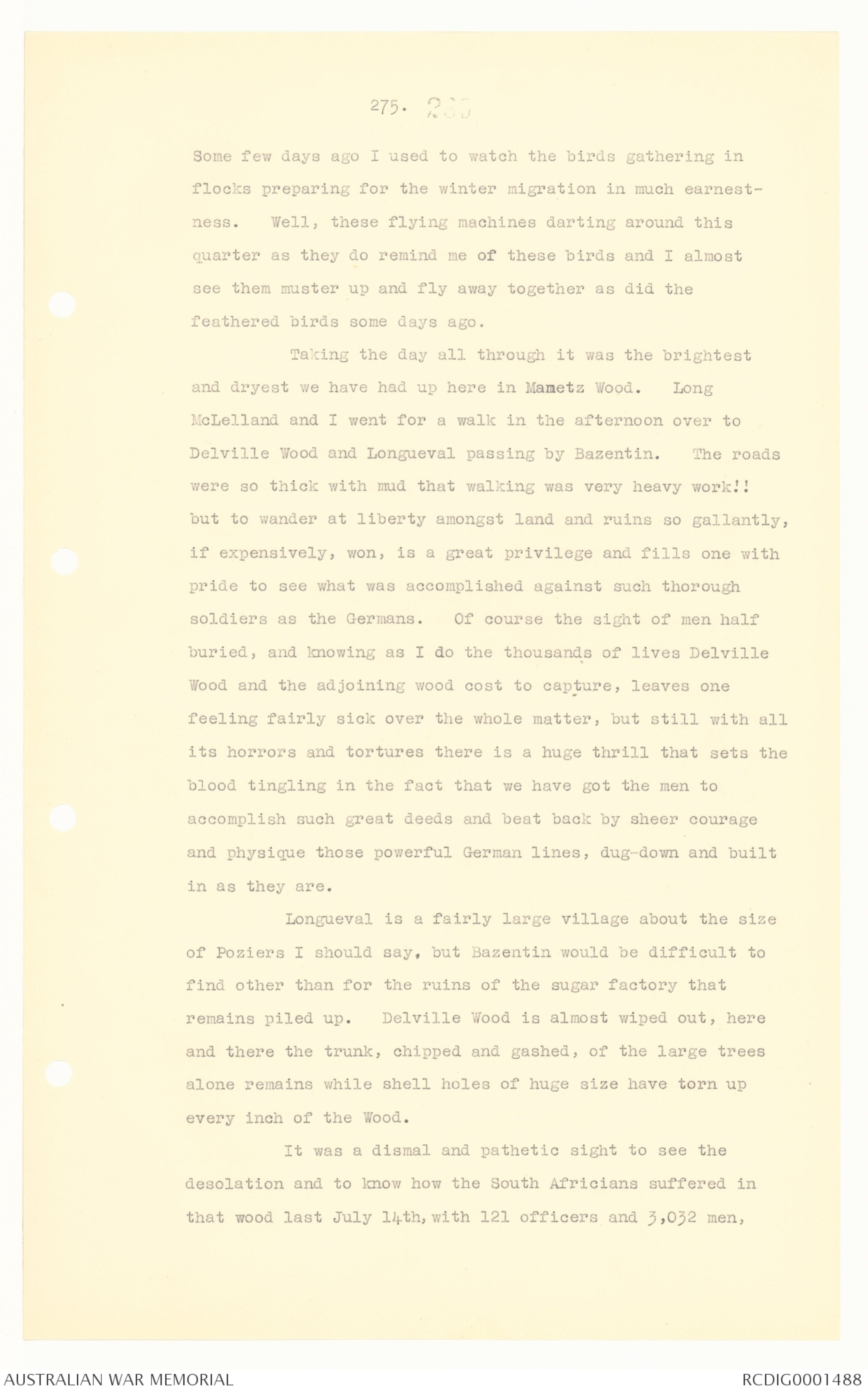
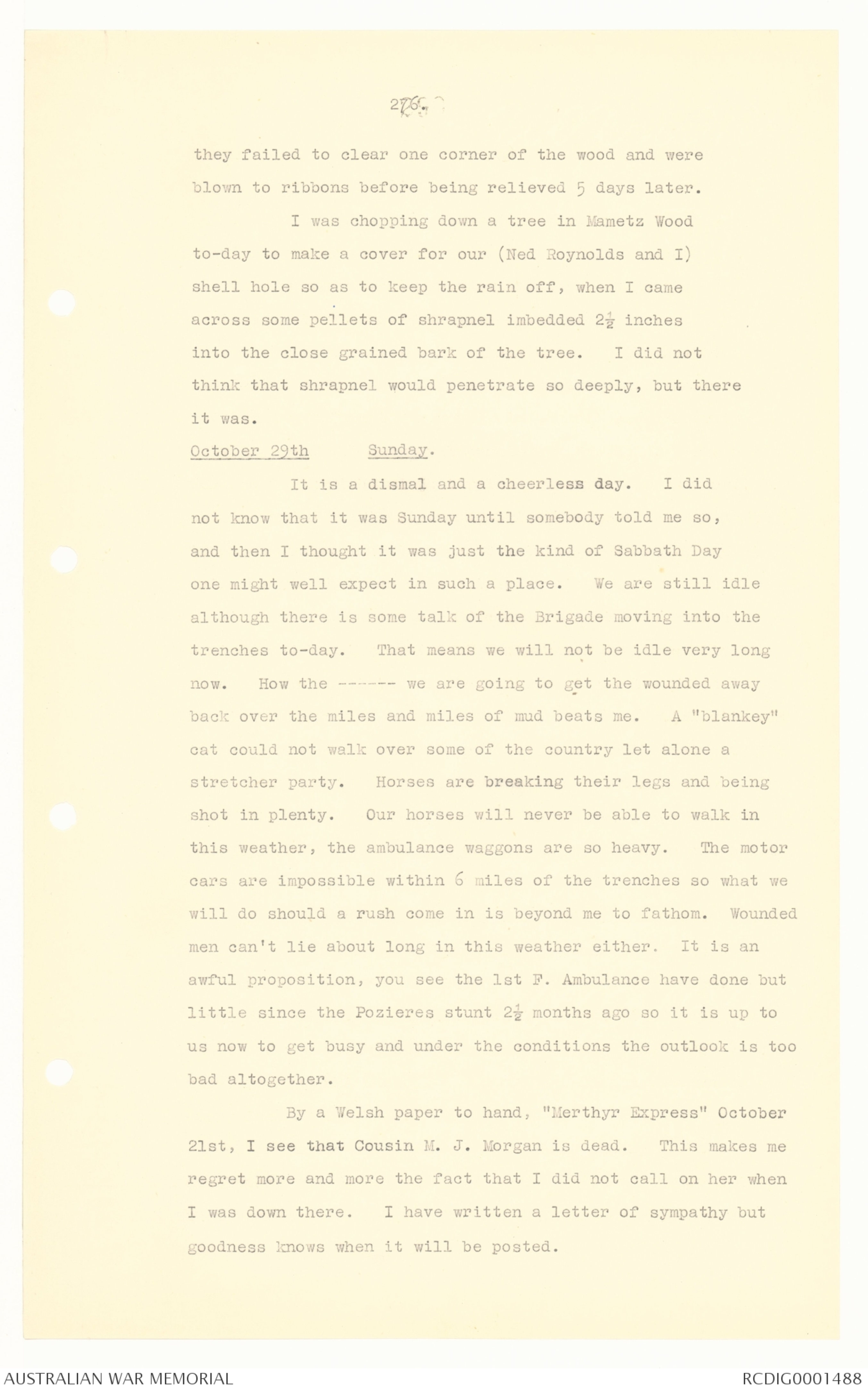
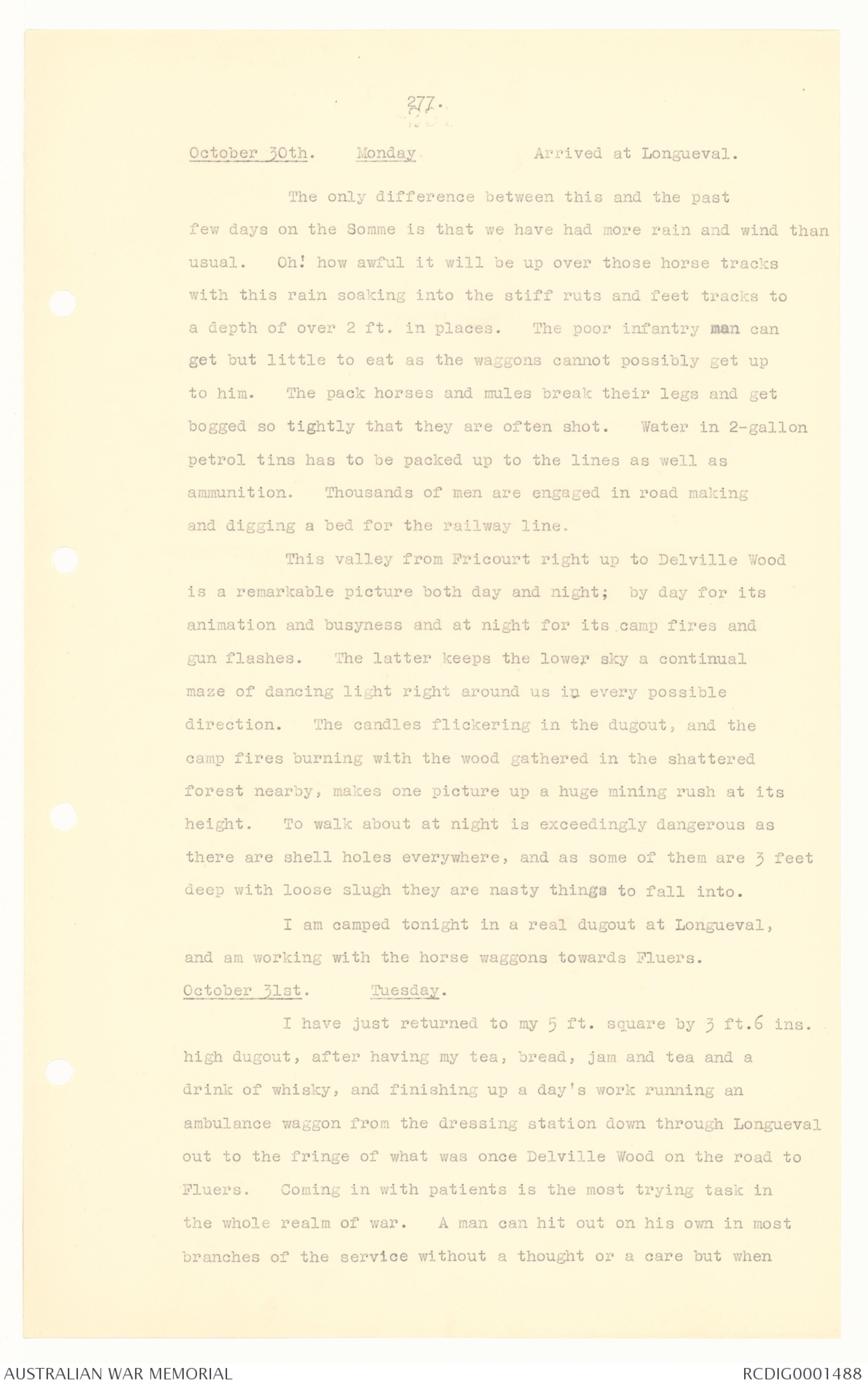
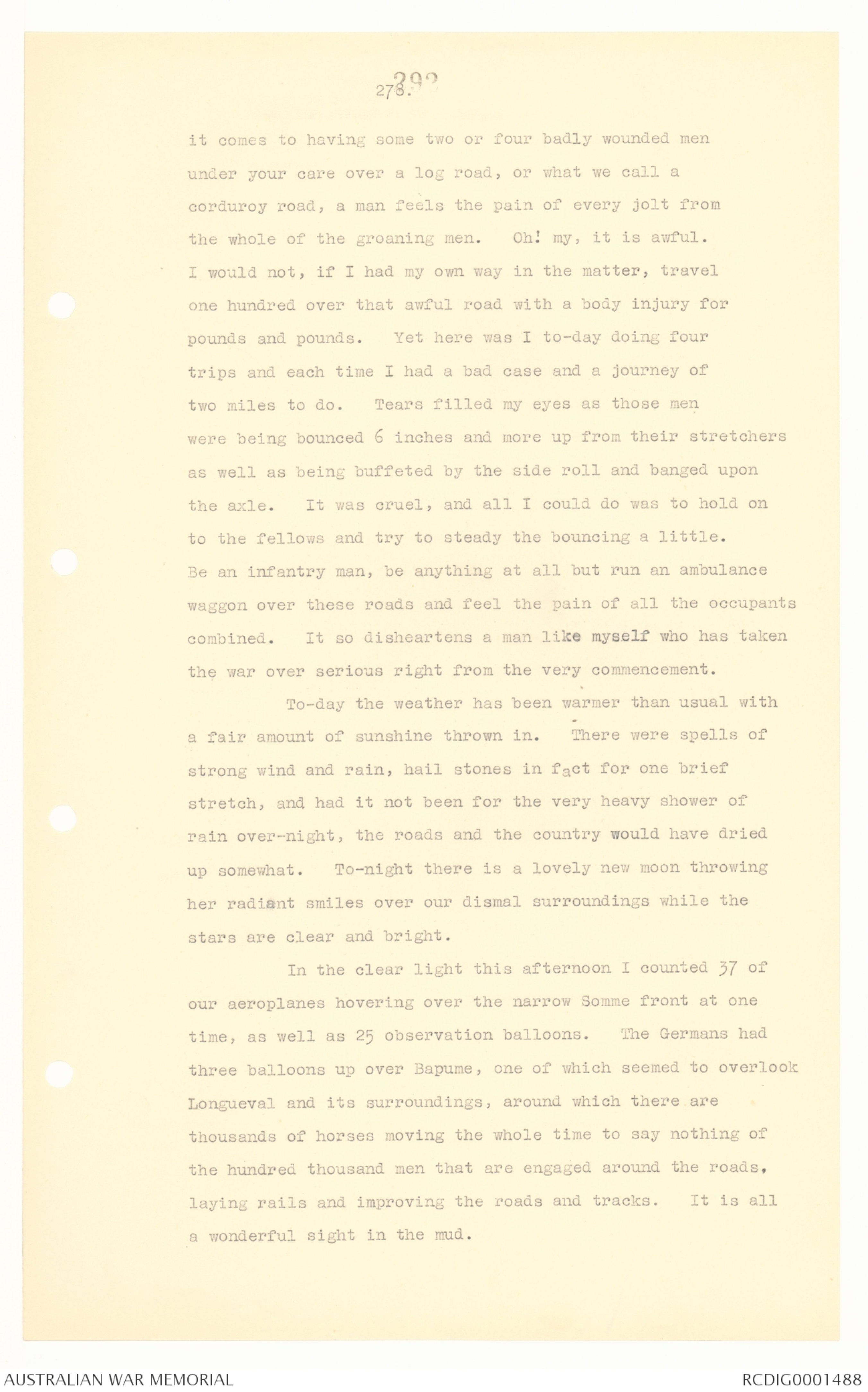
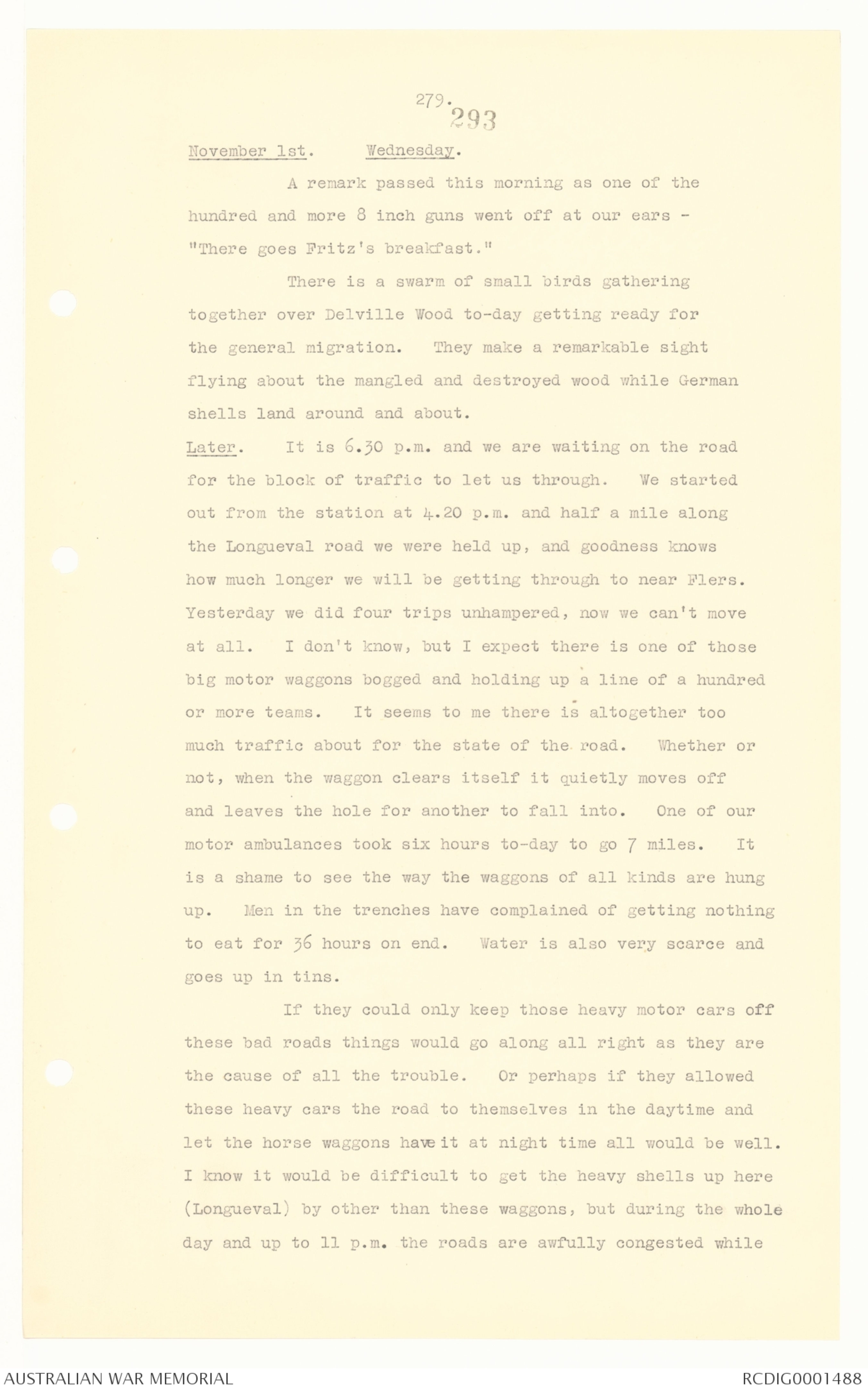
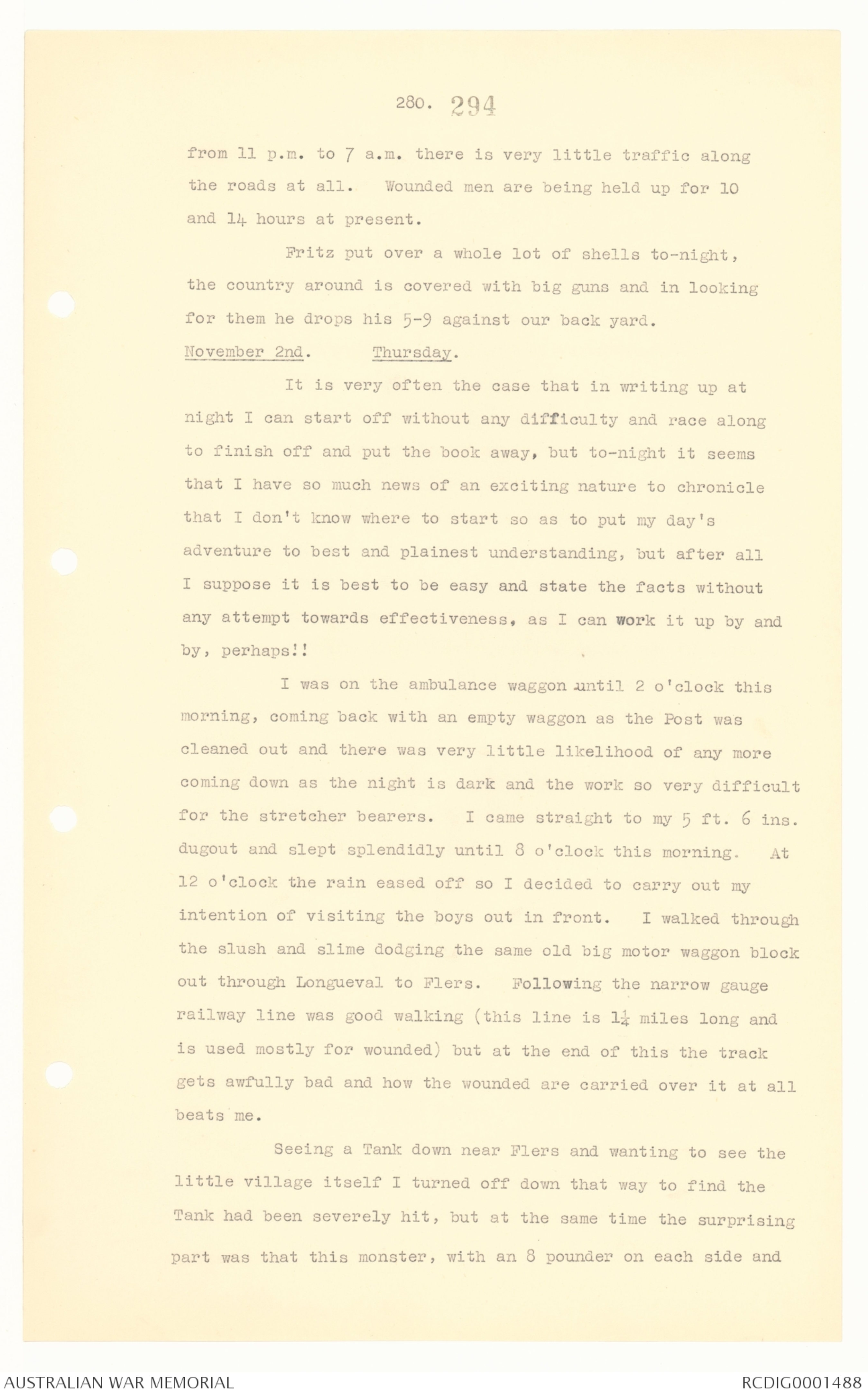
271.
285
October 25th. Wednesday.
This morning broke clear but the clouds quickly
came down and by 9 a.m. it was indeed dismal and cold with
a steady breeze blowing the cold right into the skin.
The aeroplanes were busy very early. A German
came across but was soon pushed off. At one time the sky
was speckled through with machines; there must have been
40 of them. When the clouds came down and the weather
thickened I suppose the machines went back to their sheds.
It is not yet lunch time and it is is bitterly cold.
I have just finished reading "Three Rolling Stones
in Japan" by Gilbert Watson and have found it a splendid book
indeed. In W.R. Service "Songs of a Lourdough" I find some
splendid works, full of spirit etc.
This afternoon Reynolds and I went for a walk in
the thick, heavy mud and slush. It was miserable walking
but yet so unusual and strange that I was overcome with the
novelty of the unique surroundings. Men, horses, waggons,
mules and motor cars were mud caked and just splattered along
amongst it without any outside sign of annoyance. Everybody
and everything went along the same as if there was nothing
happening.
On the railway line, a well set and laid line that
runs right up behind our trenches, were two 12 in. and one
15 in. guns laid down on the sleepers. When they are ready
to move they lift up the centre gun portion carried on a bogie
platform at each end.
October 26th. Thursday.
Another clear morning with much aeroplane activity
until the weather became dull immediately after breakfast and
spoilt the whole showing put up by German guns firing at our
planes.
There was tremendous activity amongst our big guns
for hours this morning and strange to say there was very little
272.
286
in reply from the German guns.
The morning we spent in straightening up the lines
and filling in some shell holes, after raking up the mud from
around about. There was no rain to speak of during the day
although it threatened to do so several times and made me
tremble as to the outcome of more water amongst the heavy roads.
This afternoon Harry Dingle and I went into High
Wood and Delville Wood for a stroll, and the roads throughout
were in a terrible state. The horses go down to their bellies
in places. For Dingle and I to cross the road meant very
severe struggling as the clay was so deep and sticky. Waggons,
up to the bottoms in mud, fought inch by inch with their loads
on and as many as 12 horses, tired and done up, trying to get
the goods along.
Ammunition limbers toiled along, 10 horses to the
half limber, or the single pair of wheels. This half does
not carry more than 40 18-1b. shells and it is certain that the
horses can do not more than one, or possibly two trips a day.
Now using these same horses as pack horses, each pair with the
driver could carry 16 shells (the few pack animals that are at
present being used carry up to 18 shells between the two as
well as the rider). Five pairs of horses at 16 shells a pair
is 80 shells a trip and as two trips would be easily and quickly
made, probably three if necessary, a fair comparison of the two
methods of carrying works out in favour of the pack horses as
follows - two trips with carriage 80 shells; two trips
with the same number of horses with pack saddles 160; and the
pack horses would be fresh at the end of the day.
As I said before pack horses are being used, but also
are the waggons and it is a cruel, costly shame. A black soil
plain back in Australia after continuous rains is the only
comparison.
Well, I've seen the marvellous TANKS that the
papers held up to the world with such a blaze of trumpets and
273.
287
boast. To find them in the positions that did was a
great disappointment. Of course they may have done their
work, I don't know from where or what point they started,
but to see the three of them only a few hundred yards apart
and no more than 50 yards into High Wood seemed very poor
work. Seven weeks ago they were used when the 47th London
Division captured the Wood, September 15th, so it is hard
to tell how these machines came to grief. They are now
being used to camp in by the bomb throwers of the 14th
Brigade Australia. One Tank had 2 8 lbs. one on each
side in the turret and two machine guns in front. The
other one only four machine guns, while the third had
six machine guns.
Taking the cost of a Tank at £1,5000 and the value
of a man at £200 it is plainly seen that if these Tanks only
saved the lives of 100 men in the actual attack they did their
work good and well, and as they lay there a kind of an eyesore,
they may at the same time have done their duty nobly and well.
It will be cheaper by far to lose machinery if it can save lives.
We say many remains lying about just where they fell,
and to see these brave men without even a grave to hold them
beings up sad recollections of the results achieved by the
universal progress towards civilisation throughout recent years.
It brings up ironical recollections of Hague Convention and
World's Peace Discussions.
It was dark before we got back to camp which was very
difficult to find midst the huge shell battered and trench-riven
country and the sameness everywhere. There was nothing to
stand out as a land-mark, one battered and depleted forest looks
the same as another and had it not been that Jupiter shone
brilliantly in the east we would not have known whether we were
travelling north, south, east or west.
While out in High Wood to-day there were some "coal
boxes" breaking nearby, and we were walking over that way.
274.
288
When I saw now and again the smoke of the explosion in time,
I ducked down, but Dingle wouldn't. I mentioned it to him
and his reply was - "There is nothing else to get a
fellow out of it but one of those shells. It doesn't matter."
October 27th Friday.
"Put your troubles in your old kit bag and smile,
smile, smile."
Oh! but it's a terrible day for smiling. The wind
is blowing very cold indeed and with the rain it is the very
devil to put up with, but yet the fellows plug along good
naturedly sighing one moment, cursing the next in strains
sufficiently strong enough to make even the cobble stones
hell rattle against one another our of sheer delight, or so
hard and well meant are those awful curses that the dome of
heaven might easily shake in horror.
There was a big mail in to-day, - my post came to
14 letters and some papers, although Bert's and Bill's letters being
decidedly pleasing, although Bert seems foolishly keen on
joining up again. Jim Miller writes his very cheerful letter
as usual. The unfortunate part of my whole correspondence
is that it is mostly female and I should be pushing along with
some good men friends preparing for the future. Of course
a man should not think much about the future, particularly from
our present position, and the outlook, oh! it's horrid! but
then we dare not look ahead at present that's all.
There has been very little doing around camp to-day
but swearing, although this does not bother me as I was never
more cheerful. I am writing up a little to-night. Mother,
Bert, Miller and Beere are posted.
October 28th Saturday.
The morning broke clearly as usual and the flying
men just filled up the sky with their buzzing machines.
275. 285
Some few days ago I used to watch the birds gathering in
flocks preparing for the winter migration in much earnestness.
Well, these flying machines darting around this
quarter as they do remind me of these birds and I almost
see them muster up and fly away together as did the
feathered birds some days ago.
Taking the day all through it was the brightest
and dryest we have had up here in Mametz Wood. Long
McLelland and I went for a walk in the afternoon over to
Delville Wood and Longueval passing by Bazentin. The roads
were so thick with mud that walking was very heavy work!!
but to wander at liberty amongst land and ruins so gallantly,
if expensively, won, is a great privilege and fills one with
pride and to see what was accomplished against such thorough
soldiers as the Germans. Of course the sight of men half
buried, and knowing as I do the thousands of lives Delville
Wood and the adjoining wood cost to capture, leaves one
feeling fairly sick over the whole matter, but still with all
its horrors and tortures there is a huge thrill that sets the
blood tingling in the fact that we have got the men to
accomplish such great deeds and beat back by sheer courage
and physique those powerful German lines, dug-down and built
in as they are.
Longueval is a fairly large village about the size
of Poziers I should say, but Bazentin would be difficult to
find other than for the ruins of the sugar factory that
remains piled up. Delville Wood is almost wiped out, here
and there the trunk, chipped and gashed, of the large trees
alone remains while shell holes of huge size have torn up
every inch of the Wood.
It was a dismal and pathetic sight to see the
desolation and to know how the South Africans suffered in
that wood last July 14th,with 121 officers and 3,032 men.
276.
they failed to clear one corner of the wood and were
blown to ribbons before being relieved 5 days later.
I was chopping down a tree in Mametz Wood
to-day to make cover for our (Ned Reynolds and I)
shell hole so as to keep the rain off, when I came
across some pellets of shrapnel imbedded 2½ inches
into the close grained bark of the tree. I did not
think that shrapnel would penetrate so deeply, bu there
it was.
October 29th Sunday
It is a dismal and a cheerless day. I did
not know that it was Sunday until somebody told me so,
and then I thought it was just the kind of Sabbath Day
one might well expect in such a place. We are still idle
although there is some talk of the Brigade moving into the
trenches to-day. That means we will not be idle very long
now. How the ------- we are going to get the wounded away
back over the miles and miles of mud beats me. A "blankey"
cat could not walk over some of the country let alone a
stretcher party. Horses are breaking their legs and being
shot in plenty. Our horses will never to be able to walk in
this weather, the ambulance waggons are so heavy. The motor
cars are impossible within 6 miles of the trenches so what
will do should a rush come in is beyond me to fathom. Wounded
men can’t lie about long in this weather either. It is an
awful position, you see the 1st F. Ambulance have done but
little since the Pozieres stunt 2½ months ago and it is up to
us now to get busy and under the conditions the outlook
bad altogether.
By a Welsh paper to hand "Merthyr Express" October
21st, I see that Cousin M. J. Morgan is dead. This makes me
regret more and more the fact that I did not call on her when
I was down there. I have written a letter of sympathy but
goodness knows when it will be posted.
277.
October 30th. Monday Arrived at Longueval.
The only difference between this and the past
few days on the Somme is that we have more rain and wind than
usual. Oh! how awful it will be up over those horse tracks
with this rain soaking into the stiff ruts and fee tracks to
a depth of over 2 ft. in places. The poor infantry man can
get but little to eat as the waggons cannot possibly get up
to him. The pack horses and mules break their legs and get
bogged so tightly that they are often shot. Water in 2-gallon
petrol tins has to be packed up to the lines as well as
ammunition. Thousands of men are engaged in road making
and digging a bed for the railway line.
This valley from Fricourt right up to Delville Wood
is a remarkable picture both day and night; by day for its
animation and busyness and at night for its camp fires and
gun flashes. The latter keeps the lower sky a continual
maze of dancing light right around us in every possible
direction. The candles flickering in the dugout, and
camp fires burning with the wood gathered in the shattered
forest nearby, makes one picture up a huge mining rush at is
height. To walk about at night is exceedingly dangerous as
there are shell holes everywhere, and as some of them are 3 feet
deep with loose slugh they are nasty things to fall into.
I am camped tonight in a real dugout at Longueval,
and am working with the horse waggons towards Fluers.
October 31st. Tuesday.
I have just returned to my 5 ft. square by 3 ft.6ins.
high dugout, after having my bread, jam and tea and
drink of whisky, and finishing up a day's work running an
ambulance waggon from the dressing station down through Longueval
out to the fringe of what was once Delville Wood on the road to
Fluers. Coming in with the patients is the most trying task in
the whole realm of war. A man can hit out on his own in most
branches of the service without a thought or a care but when
278.
292
it comes to having some two or four badly wounded men
under your care over a log road, or what we call a
corduroy road, a man feels the pain of every jolt from
the whole of the groaning men. Oh! my, it is awful.
I would not, if I had my own way in the matter, travel
one hundred over that awful road with a body injury for
pounds and pounds. Yet here was I to-day doing four
trips and each time I had a bad case and a journey of
two miles to do. Tears filled my eyes as those men
were being bounced 6 inches and more up from their stretchers
as well as being buffeted by the side roll and banged upon
the axle. It was cruel, and all I could do was to hold on
to the fellows and try to steady the bouncing a little.
Be an infantry man, be anything at all but run an ambulance
waggon over these roads and feel the pain of all the occupants
combined. It so disheartens a man like myself who has taken
the war over serious right from the very commencement.
To-day the weather has been warmer than usual with
a fair amount of sunshine thrown in. There were spells of
strong wind and rain, hail stones in fact for one brief
stretch, and had it not been for the very heavy shower of
rain over-night, the roads and the country would have dried
up somewhat. To-night there is a lovely new moon throwing
her radiant smiles over our dismal surroundings while the
stars are clear and bright.
In the clear light this afternoon I counted 37 of
our aeroplanes hovering over the narrow Somme front at one
time, as well as 25 observation balloons. The Germans had
three balloons up over Bapume, one of which seemed to overlook
Longueval and its surroundings, around which there are
thousands of horses moving the whole time to say nothing of
the hundred thousand men that are engaged around the roads,
laying rails and improving the roads and tracks. It is all
a wonderful sight in the mud.
279.
293
November 1st. Wednesday
A remark passed this morning as one of the
hundred and more 8 inch guns went off at our ears -
"There goes Fritz's breakfast."
There is a swam of small birds gathering
together over Delville Wood to-day getting ready for
the general migration. They make a remarkable sight
flying about the mangle and destroyed wood while German
shells land around and about.
Later. It is 6.30 p.m. and we are waiting on the road
for the block of traffic to let us through. We started
out from the station at 4.20 p.m. and half a mile along
the Longueval road we were held up, and goodnes knows
how much longer we will be getting through to near Flers.
Yesterday we did four trips unhampered, now we can't move
at all. I don't know, but I expect there is one of those
big motor waggons bogged and holding up a line of a hundred
or more teams. It seems to me there is altogether too
much traffic about for the state of the road. Whether or
not, when the waggon clears itself it quietly moves off
and leaves the hole for another to fall into. One of our
motor ambulances took six hours to-day to go 7 miles. It
is a shame to see the way the waggons of all kinds are hung
up. Men in the trenches have complained of getting nothing
to eat for 36 hours on end. Water is also very scarce and
goes up in tins.
If they could only keep those heavy motor cars off
these bad roads things would go along all right as they are
the cause of all the trouble. Or perhaps if they allowed
these heavy cars the road to themselves in the daytime and
let the horse waggons have it at night time all would be well.
I know it would be difficult to get the heavy shells up here
(Longueval) by other than these waggons, but during the whole
day and up to 11 p.m. the roads are awfully congested while
280. 294
from 11 p.m. to 7 a.m. there is very little traffic along
the roads at all. Wounded men are being held up for 10
and 14 hours at present.
Fritz put over a whole lot of shells to-night,
the country around is covered with big guns and in looking
for them he drops his 5-9 against our back yard.
November 2nd. Thursday.
It is very often the case that in writing up at
night I can start off without any difficulty and race along
to finish off and put the book away, but to-night it seems
that I have so much news of an exciting nature to chronicle
that I don’t know where to start so as to put my day's
adventure to best and plainest understanding, but after all
I suppose it is best to be easy and state the facts without
any attempt towards effectiveness, as I can work it up by and
by, perhaps!!
I was on the ambulance waggon until 2 o'clock this
morning, coming back with an empty waggon as the Post was
cleaned out and there was very little likelihood of any more
coming down as the night is dark and the work so very difficult
for the stretcher bearers. I came straight to my 5 ft. 6 ins.
dugout and slept splendidly until 8 o'clock this morning. At
12 o'clock the rain eased off so I decided to carry out my
intention of visiting the boys out in front. I walked through
the slush and slime dodging the same old big motor waggon block
out through Longueval to Flers. Following the narrow gauge
railway line was good walking (this line is 1 ¼ miles long and
is used mostly for wounded) but at the end of this the track
gets awfully bad and how the wounded are carried over it at all
beats me.
Seeing a Tank down near Flers and wanting to see the
little village itself I turned off down that way to find the
Tank had been severely hit, but at the same time the surprising
part was that this monster, with an 8 pounder on each side and
 Maralyn K
Maralyn KThis transcription item is now locked to you for editing. To release the lock either Save your changes or Cancel.
This lock will be automatically released after 60 minutes of inactivity.